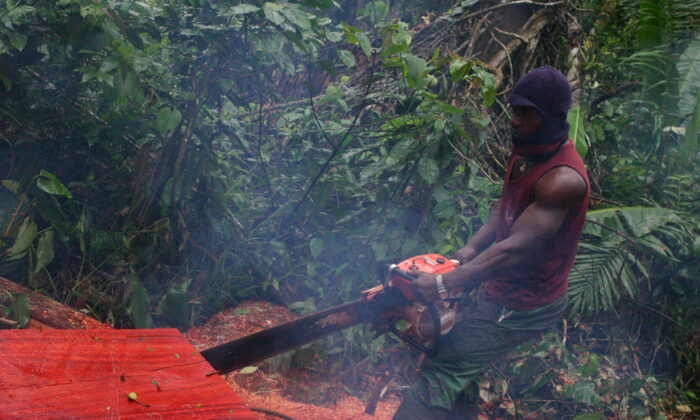New Census Data Gives Hope Decline of Kids Living with Both Parents Has Bottomed Out
YAOUNDE, Cameroon–Experts and activists are sounding alarms over the increasing deforestation pressure in Africa because of Chinese-funded projects in the continent.
China has significantly raised its footprint in Africa in recent years. According to data by China Africa Research Initiative, commercial exchange between Africa and China has multiplied by at least eight time since the 2000s.
According to Liu Kyong of the National Forestry and Grassland Administration of China, about 180 Chinese logging companies are operating in Africa.
“China-Africa cooperation and the trade that results from this will only increase,” Liu said recently.
China’s huge appetite for logging products such as rosewood has made it a major destination for timber sourced from vulnerable areas, and in some cases even UNESCO World Heritage sites in different parts of Africa, such as the nations in the Congo Basin, including Cameroon.
The International Institute for Environment and Development estimates that in 2017, 75 percent of African timber was shipped to China, and the trend is expected to keep rising with the growing demand in China.
In many cases, the products destined for China are the result of illegal logging. The U.S.-based Environmental Investigation Agency (EIA) says that China is the largest importer of illegal timber.
“China’s preference for raw timber to feed its factories has … created an unprecedented situation where long supply chains from South America, Africa, and Asia have emerged to funnel logs into the country for processing,” the EIA said in a report.
Samuel Nguiffo, executive secretary of the Cameroon-based Center for Environment and Development (CED), says China’s environmental footprint in Cameroon is rising because of the African country’s heavy dependence on Chinese funding.
According to Nguiffo, the large volumes of Chinese investment in Cameroon, including in mining projects in the eastern regions of the country, have created the conditions for forested areas to be exploited by Chinese companies.
As reported previously by The Epoch Times, since 2011, Sud-Cameroun Hevea (Sudcam), a company controlled by a Chinese-state owned conglomerate operating in Cameroon, has replaced almost 25,000 acres–equivalent to the size of Paris–of dense tropical rainforest with a monoculture rubber plantation. Sudcam’s expansion project has approached the Dja Faunal Reserve, a UNESCO World Heritage site, and has displaced locals from their land and resources.
According to Cameroon-based research consultant Samuel Assembe-Mvondo, Chinese in the economic capital of the country, Douala, engage in illicit financial flow to facilitate their illegal timber businesses. He says the companies violate local trade laws with impunity while local officials, who don’t want to upset the Chinese, look away.
Assembe-Mvondo, who has carried out investigation into the matter, said financial transactions in the trade are achieved by the traders shipping the logging products to China, and then the receiving party in China paying for the products by sending back consumer goods such as clothes and electronics to Cameroon.
“China is now effectively exporting deforestation around the world,” said Faith Doherty, head of EIA’s Forests Campaign in a statement.
In their report, EIA researchers say that China’s state-owned companies “play a strategic role” in getting forest resources to China, accounting for about half of the logging products that are shipped from different parts of the world to China.
“45 percent of all logs from Papua New Guinea were shipped to [Chinese] state enterprises and 44 percent from Mozambique,” said the 2012 report.
This article is from the Internet:Activists, Experts Concerned About China’s Deforestation Activities in Africa
